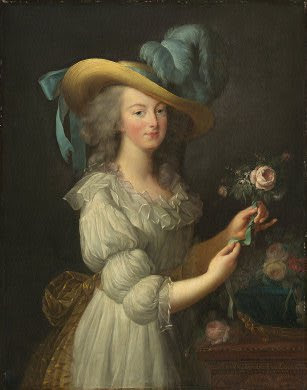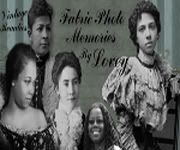At the end of her life, Marie Antoinette’s cosmetics were reduced to a tarnished mirror, a swansdown puff with some powder and a vial of scented water. As she patted the powder onto her already pallid cheeks, she must have reflected with some wonder and sadness about the fact that not too long ago, her toilette had been one of the high points of the court day, attended by dozens of courtiers, all vying for attention and dictated by an arcane and complex etiquette that had been handed down for generations.
Ironic then that Marie Antoinette’s own tastes inclined towards the discreet and modest. To the ordinary people, she was a haughty, spoiled, pampered creature who delighted in extravagance and ceremony whereas those who were closest to her, knew that on the contrary she preferred simplicity and a total lack of pomp and fuss.
She had an unerring and exquisite taste and the beautiful objects owned and worn by Marie Antoinette still exert a tremendous fascination today. Sadly the ravages of the Revolution resulted in the destruction of Marie Antoinette’s fabulous wardrobe and much of her belongings were either looted, sold abroad or lost forever but enough remains for us to have a very good idea of the luxury that she liked to surround herself with.
Marie Antoinette’s clothes collection was vast, with three whole rooms put aside at Versailles just to store it. The rooms were open to public so it was possible to visit the Queen’s clothes, just as you could go and watch her have dinner or walk past on her way to Mass in the morning. I suspect that to the fashion mad ladies of Versailles, a trip to the Queen’s wardrobe was viewed with as much reverence, if not more, than seeing her in person.
Marie Antoinette was given a fixed allowance of 120,000 Livres a year for clothes and accessories, a vast sum that was somehow never quite enough (she spent 258,000 Livres in one year), probably because at some point along the line, etiquette had decreed that eighteen pairs of pastel coloured gloves scented with violet, hyacinth or carnation and four new pairs of shoes had to be ordered for her on a weekly basis. Her weakness for the designs of Rose Bertin was also a problem here as each of her gorgeous dresses which had swooning, romantic names like ‘Indiscreet Pleasures’, ‘Heart’s Agitation’ and ‘Stifled Sighs’ cost around 1,000 Livres, sometimes even 6,000 Livres each, which quickly mounted up when you were ordering dozens at a time along with shoes, perfumed fans, feathers and extravagant hair decorations.
Strictly speaking, Marie Antoinette’s wardrobe purchases were supposed to be restricted to orders of thirty six dresses for the summer and thirty six for the winter but the Queen adored fashion and so ordered far more. According to etiquette she was only supposed to wear dresses once and had to change three times a day so clearly seventy two dresses a year wasn’t going to cut much of a dash at Versailles. Once worn, favourite dresses were kept and carefully looked after so that they never looked anything less than brand new but others were given away to her ladies in waiting.
When the Queen’s gorgeous bedchamber was renovated in the last century, several pins were discovered wedged between the wooden floorboards, a remnant of the ceremony that surrounded the dressing of the Queen. Every morning before she got out of bed, Marie Antoinette would be presented with the gazette des atours, a huge book full of fabric swatches from each of her gowns and she would place a pin in the dresses that she wanted to wear that day, which would then be brought down from the wardrobe in vast green taffeta covered baskets.
Marie Antoinette would change three times in the course of the day:
first of all there would be a formal silk or velvet gown to be worn to
Mass, followed by a lighter, more informal muslin, lawn or cotton dress
for the rest of the day and then finally a gorgeously elaborate evening
dress to be worn to dinner, concerts or balls.
The Queen’s preference was for light fabrics and pale, pastel colours
such as a soft lemon yellow, dove grey, pale green and lilac. Again,
Madame Bertin was inventive, taking an almost poetic pleasure in
thinking up names for different shades – ‘Incendie de l’Opera’ was a vivid orange red; ‘Cheveux de la Reine’ a soft gold inspired by her hair colour and, most poetically, ‘Caca Dauphin’ was a pale brown.
Before she applied her make up, she would carefully cleanse her skin with Eau Cosmetique de Pigeon, followed by Eau des Charmes astringent and then Eau d’Ange, a gentle whitener. After this white paint was carefully applied to her face, followed by a dusting of scented powder then khol around her eyes and a touch of rouge to her cheeks. Sticks of pomade scented with rose, carnation or vanilla were used to gloss her lips, eyebrows and eyelashes.
Marie Antoinette had survived a childhood bout of small pox relatively
unscathed bar a few scars but it is likely that she still enjoyed the
fashion for black velvet beauty patches – perhaps applying one to the
corner of her mouth, which signaled her wish to be kissed or one on the
forehead, which suggested that the wearer was haughty.
There was a definite emphasis on the senses – Versailles at this time
was absolutely foul smelling and the courtiers did everything they could
to keep the smell at bay. Marie Antoinette’s rooms were scented with a
profusion of fresh flowers, melted pastilles, pot pourri, oils and
perfumed sachets. She particularly loved the fresh scents of orange
blossom, lemon, rose, lavender and violet and her rooms would have
smelled heady and sweet as you entered them.The Queen loved to douse herself with eau de fleur d’oranger (orange blossom water); simple violet, rose and jonquil scents or more complex perfumes made with vanilla, musk, lavender, iris, jasmine and lily or lemon, cinnamon, angelica, cloves and coriander. It seems that everywhere she went, she wanted to be surrounded by gorgeous smells.
Unusual for the time, Marie Antoinette insisted on frequent baths and
her bathroom at Versailles still exists with simple dove grey walls and a
sloping tiled floor so that the water could drain away. Her perfumer
Fargeon invented for her the bain de modestie, which involved donning a
flannel chemise so that her body would not be exposed even to the gaze
of her ladies in waiting. Once in the bath she would sit on a large pad
filled with sweet almonds, pine nuts, linseed, marshmallow root and lily
bulb while she washed herself with muslin pads filled with gentle and
exfoliating bran and soaps scented with herbs, amber and bergamot.
It’s sad now to walk around Versailles and see these delicately hued
rooms, now crowded with tourists, where once the air was filled with the
scents of the most beautiful garden imaginable.
Now ... go make something beautiful!
¸.•´¸.•*´¨) ¸.•*´¨)(¸.•´
(¸.•´♥ Tristan ♥
Special thanks for information and some photos from "Madame Guillotine."
Photos of Kirsten Dunst as Marie Antoinette from Sophia Coppola's 2006 film "Marie Antoinette"
My birthday present from me to you ... a collage of images of the 'toinette. Click to enlarge and save to your computer to print out. Enjoy!
































































































3 comments:
I savored every word!!!!!!! LOVED all the details, so amazing. Thank you for this treasure post!!!
Loved reading about Marie Antoinette, and just imagining her beautiful "toilette" (vanity). Now I DO want to make something beautiful - lol! You have the power of persuasion, Tristan. Thank you for the beautiful, images, too!
How interesting! Thanks for posting this and hope your birthday was great!
Post a Comment